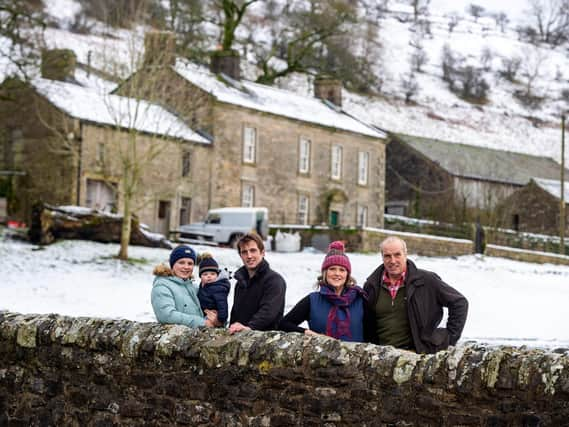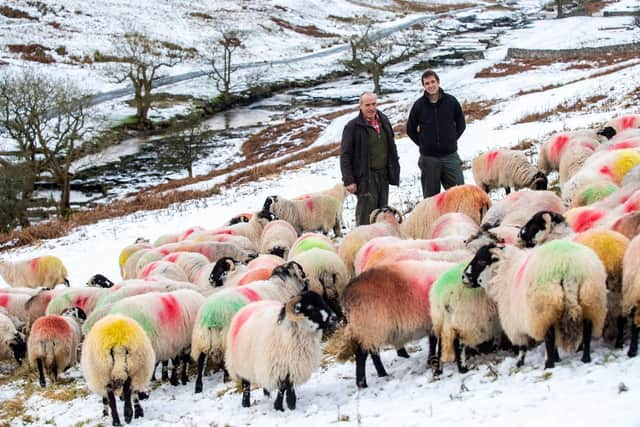Meet the Hird family, who built up the Yockenthwaite Farm breakfast brand from their home in the Dales


Yockenthwaite Farm, the brand name for the Hird family’s porridge and granola, has gone from strength to strength since it started from the farmhouse kitchen in 2004.
As well as farm shops and independents, it is stocked by Booths and Morrisons supermarkets and at the end of this month will be centrally distributed through 31 stores with the Bradford-based Morrisons chain.
Advertisement
Hide AdAdvertisement
Hide AdThe porridge and granola enterprise started when Liz Hird bought a porridge oat flaker, described by her younger son David, as being similar to “a mincing machine with rollers in it”, and started to produce breakfast cereal for the farm’s B&B guests.


David, who is head of production and responsible for sales of the Yockenthwaite brand, said the guests loved the home produce.
The Hirds joined Alistair Davy’s Northern Dales Farmers’ Markets Initiative and David said the porridge and granola really took off.
“Our first farmers’ market was at Grassington in January 2006. We took 45 bags of cereal, sold them all and realised this was an opportunity.”
Advertisement
Hide AdAdvertisement
Hide AdIn the 15 years since that first market, production of the Yockenthwaite cereals has moved from the farmhouse kitchen to a converted dairy building through a Growing Routes grant from the Yorkshire Agricultural Society and eventually to its present location at Sidings Business Park in Skipton.
“One of the interesting things in building a business through farmers’ markets, food festivals and agricultural shows is that you meet people and it helps grow the brand and build awareness,” said David.
“Sometimes you also feel as though you can’t let go, but eventually you have to make decisions about what is cost effective.”
“We started looking at other forms of marketing and promotion,” Liz said.
Advertisement
Hide AdAdvertisement
Hide Ad“It was when social media was coming on strong. We’ve since built even greater awareness which has led to the contracts we now have to supply Morrisons, Booths and The Modern Milkman, as well as many farm shops, but we couldn’t have done any of this without the whole family being behind it.”
Alongside the cereal enterprise the family farm is run by Liz’s husband, Stuart and their eldest son Eddie.
They currently have 1,000 breeding ewes, 400 Swaledale ewes at Raisgill, the neighbouring farm, and 450 ewes at Yockenthwaite along with crossbred breeding ewes.
“We are National Trust tenants. We farm from 1,200ft rising to in excess of 2,000ft. We tup half of the Swaledales pure and half to the Bluefaced Leicester to produce Mules," said Stuart.
Advertisement
Hide AdAdvertisement
Hide Ad“We tup half of the Dalesbreds pure but we’ve started to change from the Bluefaced Leicester to the Texel for the other half of the flock.
“This year we have 110 tupped to each. We lamb in March to mid-May and I was really pleased with our first Texel cross lambs last year.”
It was selling lamb boxes direct from the farm when the Hirds had a Rouge de L’Ouest flock which first sowed the seeds for home produce.
Liz, whose parents farmed at Settle, had been secretary for the North of England Mule Sheep Association and the National Sheep Association’s Northern Area, as well as having worked at Hawes livestock market.
Advertisement
Hide AdAdvertisement
Hide AdBut it was when she purchased a couple of Rouge ewes that the ball started rolling towards what would eventually be the Yockenthwaite brand with granola and porridge.
“We started our boxed lamb in the 90s,” said Liz. “We set up a website and sold as half or whole lamb.
“Farmers’ markets were in their early days and we couldn’t get in as they wouldn’t have more than one lamb producer on site.
“We put up a notice promoting Yockenthwaite Lamb but then in 2001 came the foot and mouth outbreak.”
Advertisement
Hide AdAdvertisement
Hide AdThe family’s experience had shown them their point of difference was local and homemade or homebred, so they made the decision to apply for a grant for refurbishment, putting in better facilities and building a better website.
Since then the lamb boxes have been superseded by the growing cereal brand.
“From the beginning we have always been aware that you cannot promise what you cannot deliver, so we’ve had to keep growing,” said Liz.
“All businesses have to adapt and adjust to whatever the current situation.”
Advertisement
Hide AdAdvertisement
Hide AdWhether it is cereals or sheep the family works together to grow their business.
“Eddie and I always do whatever we can with Yockenthwaite and the rest of the family do the same on the farm. We’re basically all hands on deck,” Stuart said.
Comment Guidelines
National World encourages reader discussion on our stories. User feedback, insights and back-and-forth exchanges add a rich layer of context to reporting. Please review our Community Guidelines before commenting.